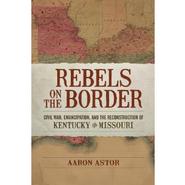
Louisiana State University Press has published Rebels on the Border: Civil War, Emancipation, and the Reconstruction of Kentucky and Missouri by Aaron Astor '95. The book focuses on the border states Kentucky and Missouri and places them in context of local, southern, and national politics. It examines how they formalized the previous resistance to slavery, even as new black citizenship and voting rights triggered a violent white reaction and a new definition of white identity.
Michael Fellman, author of Inside War: The Guerrilla Conflict in Missouri During the American Civil War, has said: ''In this clearly and forcefully written study, employing meticulous research skills, Aaron Astor reconstructs an utterly realistic panorama of the era of the Civil War in the border states of Kentucky and Missouri. Far from a romantic portrait of racial progress, what emerges is a sobering account of the sustaining force of a white supremacist nation whose long-term effects still corrode American society.
Astor has also contributed seven articles to the New York Times Disunion blog about the Civil. He has written on "Andrew Johnson's Difficult Task," "Unconditional Surrender," "The Switzerland of America," "The Party Spirit on Trial," "Bluegrass Blues and Grays," "The Fog of War," and "The Conspiracy at Lick Creek."
Astor is currently associate professor of US History at Maryville College in Maryville, Tennessee, where he has been since 2007.
His next project is a book tentatively titled Electing Civil War, which will be about the 1860 election at the grassroots in four distinct communities: Rutland, VT; Cincinnati, OH; Clarksville, TN; and Madison County, MS. He plans to argue that the long election season itself, which began with the responses to John Brown's raid at Harpers Ferry in October 1859, culturally prepared an already-divided America to go to war with itself.
At Hamilton, Astor majored in philosophy and minored in government and was a member of Theta Delta Chi. He spent a year abroad at the University of Edinburgh in Scotland He went on to earn his Ph.D in history at Northwestern University in 2006.
